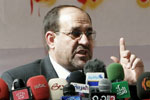 UPI: Iraq’s descent into another sectarian civil war, prompted by Maliki’s determined efforts to marginalize the Sunni population, has become an embarrassment to the United States, which regard the Iraqi prime minister as their adopted son. By STRUAN STEVENSON, UPI Outside View Commentator
UPI: Iraq’s descent into another sectarian civil war, prompted by Maliki’s determined efforts to marginalize the Sunni population, has become an embarrassment to the United States, which regard the Iraqi prime minister as their adopted son. By STRUAN STEVENSON, UPI Outside View Commentator
 BRUSSELS (UPI) — Iraqi Prime Minister Nouri al-Maliki seems determined to carve out a role for himself as Saddam Hussein’s worthy successor.
BRUSSELS (UPI) — Iraqi Prime Minister Nouri al-Maliki seems determined to carve out a role for himself as Saddam Hussein’s worthy successor.
Angered at critics in the press who have highlighted the spiraling violence and human rights abuse in Iraq, Maliki has banned al-Jazeera and nine Iraqi TV channels, eight of which are Sunni. Without licenses, news crews from the banned channels will be arrested if they attempt to operate in Iraq.
Iraq’s descent into another sectarian civil war, prompted by Maliki’s determined efforts to marginalize the Sunni population, has become an embarrassment to the United States, which regard the Iraqi prime minister as their adopted son.
U.S. State Department assertions that they were leaving behind a “functioning democracy,” following the withdrawal of American troops from Iraq, now have a hollow ring.
Mass demonstrations against Maliki have been going on in six of Iraq’s provinces and most of the major cities for the past four months. Hundreds of thousands of protesters are pouring onto the streets, particularly following Friday prayers, to demand an end to sectarian oppression, human rights abuse and arbitrary executions.
Maliki has tried to stem the protests by offering talks, bribes and concessions, but all to no avail. In desperation, he turned to his real sponsors, the mullahs in Iran, who willingly dispatched their menacing Minister of Intelligence Heydar Moslehi, who was more than happy to advise Maliki on how Iran deals with street protests and demonstrations.
His advice manifested itself last week when Iraqi security forces, acting on the direct orders of Maliki, launched a deadly attack on Sunni protesters in the central city of Hawija, killing 23 people.
Since that unprovoked attack on innocent civilians, more than 180 people have been killed in gun battles with security forces and other assaults. Arbitrary arrests, constant executions and torture of prisoners — particularly the torture and rape of female detainees, have increased to such an extent that Human Rights Watch, Amnesty International and even the European Parliament have formally objected.
The current tide of protests began following the attempted arrest of the Iraqi Vice President Tariq al-Hashemi, a leading Sunni, who has been sentenced to death in absentia five times for alleged terrorist offences based on evidence obtained after his 12 bodyguards were imprisoned and tortured. One of them died under torture, the remaining 11 bodyguards have each been sentenced to death.
This tragic farce was quickly followed by attempts by Maliki to remove another senior Sunni from his Cabinet, with security forces on 12 December last year raiding the office and home of Finance Minister Rafi al-Issawi.
For Iraq’s 10 million Sunnis, this was the last straw. They refuse to be sidelined and oppressed by Maliki, who retains a tenuous grip on power largely thanks to Shiite Iran.
Maliki was re-instated for a second term as prime minister following elections in March 2010, when his party gained 89 seats compared to 91 seats won by Ayad al-Allawi’s al-Iraqiya party. Despite having narrowly lost the election, Maliki was bounced back into office through pressure from the mullahs in Tehran who could not stomach a non-sectarian government of national unity promised by Allawi.
Iran cajoled and bullied the faction led by Muqtada Sadr and the pro-Iranian Hakim party to form a coalition with Maliki and the Kurds.
In a subsequent agreement signed in the presence of the U.S. ambassador to Iraq (The Erbil Agreement), Maliki agreed to appoint representatives from Allawi’s faction into key government posts as ministers of defense, interior and security. In fact he has never done so and his office maintains full authority over the army, police and intelligence services, giving him virtual dictatorial powers.
Maliki also runs one of the world’s most corrupt regimes. Despite restoring oil production to an all-time high with an estimated $80 billion in earnings last year alone, much of this money simply disappears.
The infrastructure, devastated during the U.S. invasion and the insurgency, has never been restored. There are only around 4 hours of electricity a day in Baghdad and most major cities. Many people do not have access to fresh running water. Sewer systems have broken down. Pollution is rife. Baghdad is one of the world’s filthiest capitals.
And to cap it all, youth unemployment is running at around 30 percent. An entire generation has lost faith in the corrupt and oppressive Maliki government.
The recent provincial elections will be a good pointer to where Iraq is going next. Despite allegations of violence and vote rigging and a turnout of less than 50 percent, it seems that many ordinary Iraqis took the chance to register their protest against the ruling clique in the ballot box.
When the final result is announced, it may prove that there is still a spark of democracy that may yet bring peace, stability and the rule of law to the beleaguered people of Iraq.
—
(Struan Stevenson is a Conservative Euro Member of Parliament from Scotland. He is president of the European Parliament’s Delegation for Relations with Iraq. He also is chairman of the “Friends of a Free Iran” group in European Parliament.)


